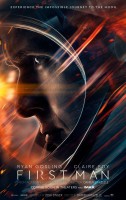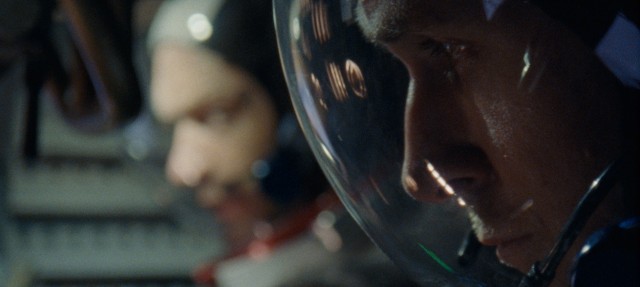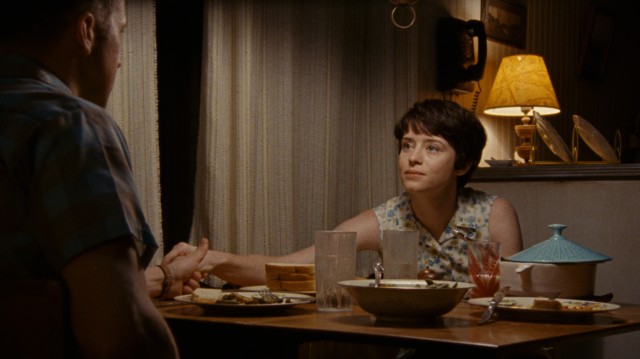First Man Movie Review
 |
First Man
Theatrical Release: October 12, 2018 / Running Time: 141 Minutes / Rating: PG-13 Director: Damien Chazelle / Writers: Josh Singer (screenplay); James R. Hansen (book) Cast: Ryan Gosling (Neil Armstrong), Claire Foy (Janet Armstrong), Jason Clarke (Ed White), Kyle Chandler (Deke Slayton), Corey Stoll (Buzz Aldrin), Patrick Fugit (Elliott See), Christopher Abbott (David Scott), Ciarαn Hinds (Bob Gilruth), Olivia Hamilton (Patricia White), Pablo Schreiber (Jim Lovell), Shea Whigham (Gus Grissom), Lukas Haas (Mike Collins), Ethan Embry (Pete Conrad), Brian d'Arcy James (Joseph A. Walker), Cory Michael Smith (Roger B. Chaffee), Kris Swanberg (Marilyn See) |
Damien Chazelle's second film as writer-director, Whiplash (2014), earned an Academy Award nomination for Best Picture. It had no shot at winning, but it was truly just an unusual honor for a $3 million indie from a 28-year-old filmmaker to be nominated. His third, La La Land (2016), was announced as the winner of 2016's Best Picture, On paper, Chazelle's fourth directing credit may sound like the work of someone determined to win that award. First Man is a biopic of the astronaut Neil Armstrong, something that somehow hasn't been done before in cinema. But the notion that Chazelle is chasing statuettes with something safe and conventional in an historically decorated genre goes out the window in the very first scene. No, we don't get Neil Armstrong as a child prodigy or young star-gazer. Instead, we see Armstrong (Ryan Gosling) manning a rocket over California's Mojave Desert. It's 1961 and NASA is taking great pains to keep up with the Soviet Union in the mid-century Space Race.
Most of us think of flight, especially flight into space, as something beautiful and uplifting. Our first look at it here is anything but, as Armstrong peeks out tiny windows to get fleeting glimpses of the Earth's atmosphere amidst the stress of rickety analog altitude readings and unresponsive controls. The thirtysomething astronaut endures a scare as the vessel hangs at the edge, fatal destruction always a possible outcome.
We already know it's not really a possible outcome, because we know Armstrong's name and we know why we know his name. But that doesn't keep the experience from being tense and gripping, as is much of First Man, an artistic endeavor that eschews convention both of biopics and narrative films throughout.
Chazelle's newest film, which is written by Academy Award winner Josh Singer (Spotlight, The Post), chooses from its start not to tell, but to show. And that it does in a masterful way. The film offers a mix of Armstrong's home life and his career. The former unfolds in a manner reminiscent of modern Terrence Malick cinema. No, it doesn't use voiceover narration and forgo dialogue, but it does cast Armstrong's Texas life in the light of a dreamy poem.
One of the biggest issues at home is a tumor in Karen, the young daughter of Neil and his wife Janet (Claire Foy). The girl is soon buried and that death results in the astronaut breaking down in tears. Waterworks from the leading man? You're back to thinking this has got to be Oscar bait, right? Well that winds up being the greatest display of emotion that Armstrong gives us and it is in solitude.
No one would contest calling Armstrong a hero and yet here he is not the way we assume heroes are. Calm, confident, outspoken, and fast-thinking: that's not the Armstrong that Gosling plays. He's a loving father and husband and one assumes if he's being picked to command the country's most important space missions to date he's brilliant also. But he's an introvert, who answers his children's questions like he responds to reporters at a press conference. And his wife has to pressure him into having the conversation with his kids that he might not return from the unprecedented Apollo 11.
By the time that mission arrives, we've seen eight years of trials, including ones that have resulted in the deaths of some of Armstrong's closest colleagues. It's a bit disarming how that mission to the moon by Armstrong and Buzz Aldrin (Corey Stoll) kind of creeps up on us. Plenty of time has gone into detailing the preparation for this risky venture. And suddenly it's here. And just as soon, it seems to be over, but not before Chazelle has conveyed the enormity of the voyage and of the still remarkable fact that human beings walked on the freakin' moon.
First Man is as much a technical achievement as it is a dramatic one. It will undoubtedly contend in a number of minor Oscar categories, many of which La La Land was nominated for and some of which Whiplash was too. With this film, Chazelle proves definitively he's not a fluke. This isn't some wunderkind trying to avenge his Oscar loss (and it should be noted La La Land won him Best Director, making him the youngest person to take that award) with an Oscar win. This also isn't some attempt to prove that he can play in the same sandbox as Marvel and Christopher Nolan. For one thing, First Man has a budget of $59 million. That's twice as much as La La Land cost and twenty times as much as Whiplash, but it's still a far cry from the nine-figure budgets that today's tentpoles regularly enjoy. And yet, First Man fills us with wonder and awe to rival any new movie and it does so without regurgitating old good and evil themes with costumed escapism.
If you think Gosling is just an actor coasting on his looks, you haven't been paying much attention to his career. He has excelled this decade both as an actor and at picking projects that are worthwhile, one of the most important things to define and distinguish a career. So wonderful was La La Land that you hoped he and Chazelle would reunite. That they do so less than two years later and in a film that is nothing like their first collaboration is a most pleasant surprise. Gosling's powerful characterization is not the kind that the Academy recognizes and he is more likely to miss out on even a nomination than he is to win Best Actor. But it's a fine turn he can add to his long list of varied, excellent 2010s work.
Foy is good in a role that seems big enough to crack the Supporting Actress race. No one else in the cast has any shot at awards, but there is many a familiar face tastefully chipping in necessary notes, from Best Picture nominee fixture Kyle Chandler to Jason Clarke to former child actors Patrick Fugit, Ethan Embry, and Lukas Haas. It's as if Chazelle went through a list of the decade's best films and drew up a list of valuable players with which to make this film. You imagine no one would say no to even just auditioning for the guy who made Whiplash and La La Land. Even Steven Spielberg is on board as executive producer. The only disappointment may be the fact that J.K. Simmons evidently relinquishes his good luck charm status, despite the abundance of minor roles he could have easily filled.
Justin Hurwitz, another repeat Chazelle collaborator (and former classmate), returns to craft a potent score. Unrecognizable from his past compositions, the music is, like everything else about this film, fairly understated and most suitable.
First Man is sure to be cherished by those who find, say, the dumbed-down, fictionalized history of Hidden Figures trivial and pandering. The recognizable cast should be the only thing that ages this seemingly timeless dramatization, whose cinematic thrills invite comparison to all space films past from the historical Apollo 13 to the fictional Interstellar and 2001: A Space Odyssey. The director and writer resist every opportunity to go big and manipulative and biopic-y to give us something true and sincere that's highly compelling without dramatic license being taken. Chazelle's unconventional approach could hurt the film commercially, but the subject matter and buzz around it are enough to ensure an unusually strong opening for an adult drama. Even if the legs aren't fantastic and the Amazon customer rating falls (the sub 7.0-IMDb viewer rating on release day is concerning), this still seems poised to be a major presence throughout awards season and yet also quite capable of coming away empty-handed from a host of nominations.
|
Related Reviews:
DVDizzy.com | DVD and Blu-ray Reviews | New and Upcoming DVD & Blu-ray Schedule | Upcoming Cover Art | Search This Site
DVDizzy.com Top Stories:
Directed by Damien Chazelle: La La Land
Ryan Gosling: The Nice Guys Blade Runner 2049 The Big Short The Ides of March | Claire Foy: Unsane Season of the Witch
Kyle Chandler: Manchester by the Sea Zero Dark Thirty Argo Game Night | Corey Stoll: Ant-Man
Written by Josh Singer: Spotlight The Post The Fifth Estate
Hidden Figures Gravity Interstellar Sully Flight
Now in Theaters: A Star Is Born Bad Times at the El Royale 22 July White Boy Rick
Text copyright 2018 DVDizzy.com. Images copyright 2018 Universal Pictures, DreamWorks Pictures, Perfect World Pictures, and Temple Hill Productions.
Unauthorized reproduction prohibited.

